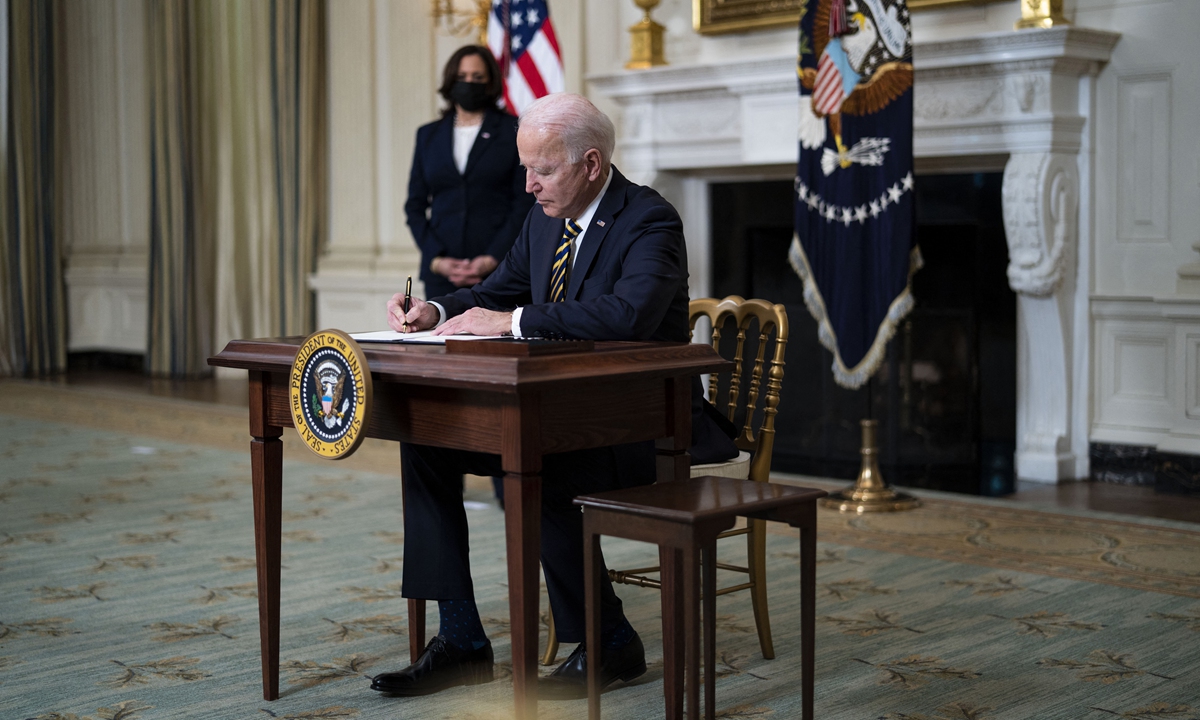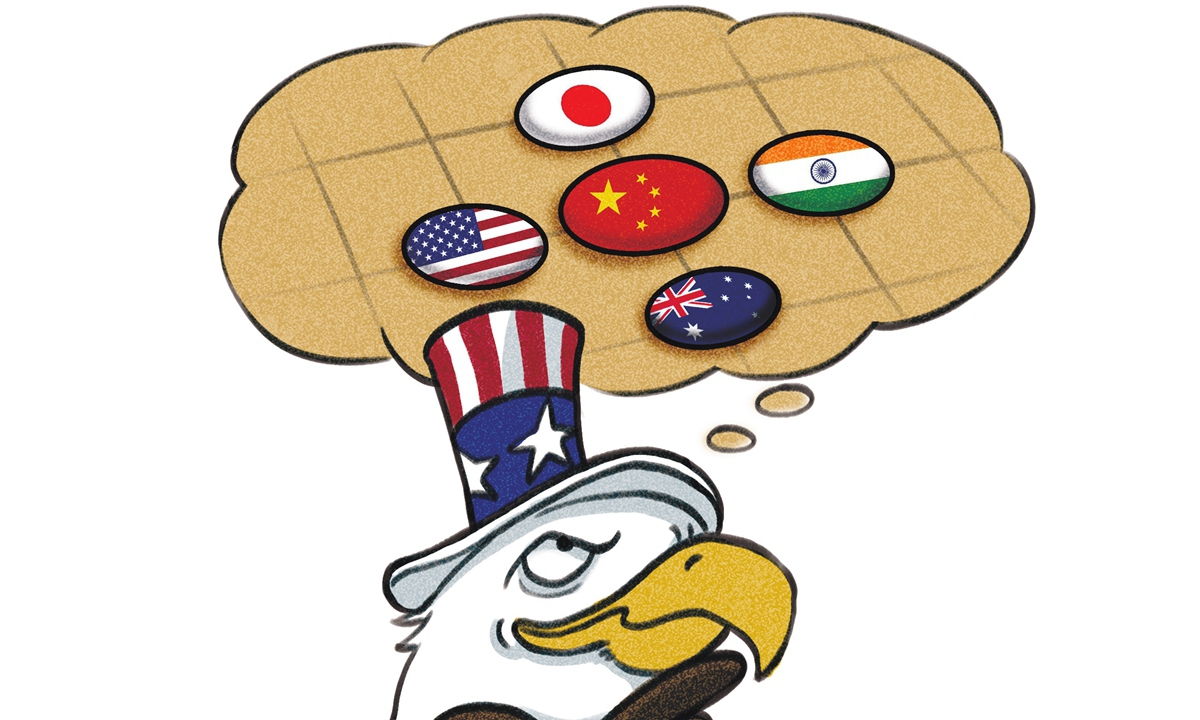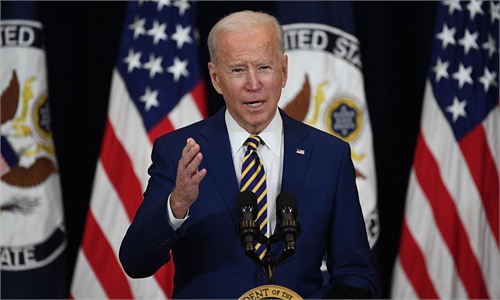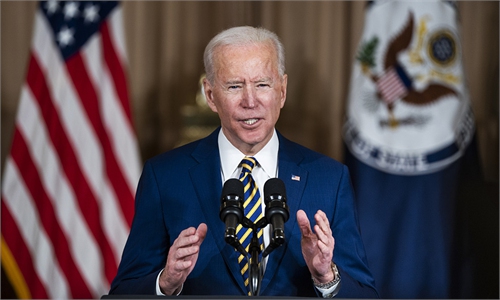Quad alliance countering China doomed to fail due to member’s 'all-for-self' attitudes

US President Joe Biden signs an Executive Order on the economy on Wednesday in the White House. Photo: AFP
Senior US officials have filled their mid-March calendars with a slew of visits and discussions with their Asian allies, including the US defense secretary's visit to India, and President Joe Biden's virtual meeting with leaders of Quadrilateral Security Dialogue (Quad).
The busy schedule of arrangements seems, to Chinese observers, like a "water-testing" move from the US to sound out its Asian partners' attitude toward forming an "unbreakable alliance" to counter China's rise.
Yet Chinese experts believe the US' test will end up in dismay, as other members in the club have an "all-for-itself" agenda, and won't tie themselves to the US' scheme. The divergences in each country's goals will eventually dissipate the Quad, which will make it resemble an "empty talk club," instead of a security alliance, said observers.
US Defense Secretary Lloyd Austin is likely to visit India next week, Reuters quoted an Indian government source as saying on Sunday, noting that the two allies are likely to seek deepening military ties to counter the growing power of China in the Asia-Pacific region.
The US defense chief will join Secretary of State Antony Blinken on a visit to Japan and South Korea, sources told Reuters on Thursday. It was not immediately clear whether Blinken will also visit India, Reuters reported.
The news agency predicted that closer bilateral military ties could bring New Delhi greater access to American technology, as India tries to modernize its defense system amid tensions with neighbouring China.
Listing India among the first group of countries that the new US defense chief will visit shows the US attaches great importance to India, yet how long the seemingly robust interaction between Washington and New Delhi will last is yet to be seen, Yang Xiyu, senior research fellow at the China Institute of International Studies, told the Global Times on Monday.
He said that Washington and New Delhi always have their own interests in their minds: The US wants to seize India as weight to retake its hegemony in the Indo-Pacific region and counter China; and India plans to showcase its cooperation with the US to bluff in front of China regarding its influence.
"India will never settle for being just a subsidized ally of the US, the stance is determined by its fundamental principle of nonalignment and ambition to become a world superpower. Moreover, New Delhi cannot afford the cost of provoking China by publicly taking sides between Beijing and Washington," said Yang.
Experts noted that even the highlight of US-India ties - defense cooperation - has little substance. India's defense system relies heavily on Russian weapons and equipment, and will find it hard to integrate smoothly into a US-led defensive pact, Qian Feng, director of the research department at the National Strategy Institute at Tsinghua University, said on Monday.
"Moreover, US military equipment remains too expensive for India to afford," he noted.
Observers also said the duration of the US-India alliance depends on the development of China-India relations. The once frozen ties between Beijing and New Delhi are gradually thawing with disengagement of militaries completing in the border region.
In a Sunday press conference, Chinese State Councilor and Foreign Minister Wang Yi said that similar situations faced by China and India mean the two countries share the same or like-minded stances toward many major issues, which makes China and India friends and partners, not threats and opponents to each other.
Wang said that the border issue is a historical problem not representing the entirety of bilateral relations between the two sides, with peaceful negotiation the only way out.
Yang noted that Wang's comments also carry a message that what happened between China and India is a matter between the two countries, and a regional matter, which should be solved by only these two, not tolerating any interference from outside.

Illustration: Liu Rui/GT
A fragile club
At the same time, US President Joe Biden, Japanese Prime Minister Yoshihide Suga, Indian Prime Minister Narendra Modi and Australian Prime Minister Scott Morrison will meet online as early as next week for the first summit of the Quad, since the framework was formed in 2014.
Japan's Nikkei said that the dialogue seeks to form a united front in the Indo-Pacific region to push back against the growing influence of China.
Lü Xiang, a research fellow on US studies at the Chinese Academy of Social Sciences in Beijing, said Monday he sees the Biden administration's eagerness to test its Asian partners' loyalty, via this slew of frequent visits and meetings. "The Quad has existed for so long, yet the US still has no clue on which level the members can reach consensus of confronting China."
Experts noted the fact that members have an "all-for-itself" agenda has made the framework flimsy and "symbolic rather than an actual alliance."
Abhijit Singh, a former Indian naval officer at the Observer Research Foundation, was quoted by the Financial Times as saying that India was unlikely to pursue an immediate deepening of Quad military cooperation given the recent partial disengagement of Chinese and Indian troops. He said India was also "a bit wary of turning the Quad into some kind of anti-China coalition".
Yang noted that Japan, neighboring a strong China, also has reservations of tilting too close to the US, which does not fit its interests.
Chinese observers said that Quad members are also aware of the inability of the US to form a strong alliance in the Indo-Pacific region, as Washington now has its feet bogged down in retreating from the Middle East, roping in European allies; and tackling domestic problems such as COVID-19, as well as saving its sluggish economy.
Lü said that the US will be disappointed regarding the outcome from the visits and discussion with its Asian partners, as forming an alliance against a certain country had lost its significance seen during the Cold War, when we are placed in a world that embraces multilateralism.
The prospect of the US' effort in pulling over Europe already looks dim. The EU defied the Biden team's repeated threats and signed a new investment deal with China at the end of last year. During the Munich Security Conference held in February, German Chancellor Angela Merkel downplayed the US president's call for Europe to take sides between the US and China. Instead, she stressed that multilateralism provided the basis for all political activities and those multilateral organizations should be strengthened.
In Sunday's press conference, Wang also stressed that multilateralism within small circles is still bloc politics, and that "multilateralism by choice" is not the right option.
Lü predicted that within the small circle of the Quad, where an anxious US wants to take charge, and other members all have their own agendas, as well as concerns confronting China, the framework will eventually resemble an "empty talk club" instead of a real security alliance.




